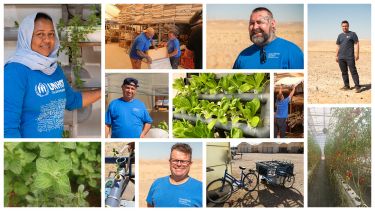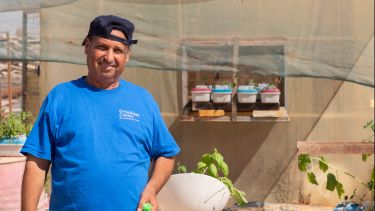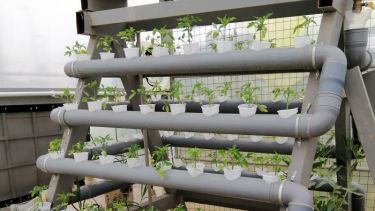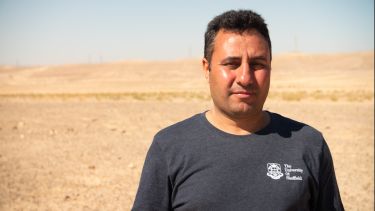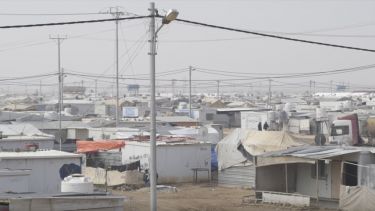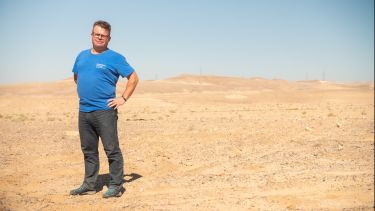Desert Garden appeal
A unique project born out of innovative Sheffield science is giving families displaced by war the opportunity to grow fresh food in the desert using discarded mattresses, not soil. But time is running out. Without your help, the Desert Garden project will end. Will you help secure its future?
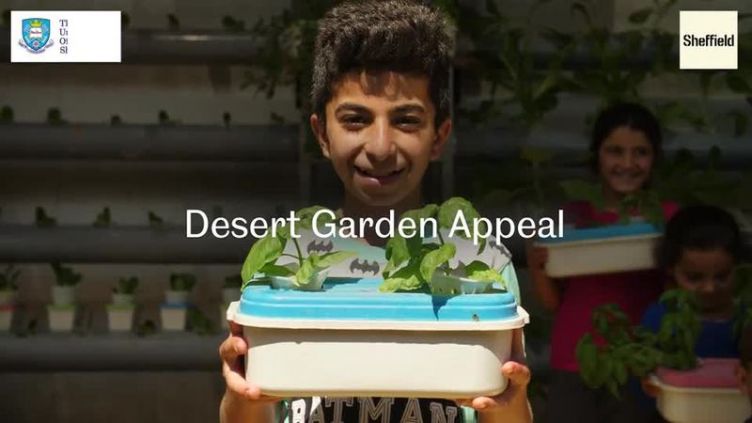
Thank you so much for supporting the Desert Garden Appeal
Supporters have helped raise £280,000 to aid thousands of Syrian refugees living in camps in the Jordanian desert. These funds are being used to obtain materials and train residents to grow their own fresh food using ground-breaking Sheffield science. The project is well on its way to being fully sustainable; ensuring this lifeline to families living in the camp can continue for as long as it needs to.
Things haven’t been easy for the Syrian refugees living in Zaatari and its sister camp Azraq. They’ve had to endure strict lockdowns, the closure of their community centres, and uncertainty over the spread of Covid-19.
The project itself has also faced challenges such as the ability to train new growers in person, and the rising cost and scarcity of materials. But thanks to your support, the project team and the UNHCR have been able to push on regardless.
Virtual training sessions were established and mobile phones distributed to participants. This meant the team could open up communication channels and offer immediate support to new and existing growers. They’ve been able to source alternative materials and distribute them safely under social distancing. And they’re moving ahead with plans to make organic fertilizer from food waste in the camps.
Your continued support for Desert Garden is making such a huge difference. Thank you.
Improving lives in the harshest of circumstances
Forced to flee the war in Syria, there are currently 80,000 people living in Zaatari, the world’s largest Syrian refugee camp and now Jordan’s fourth largest city. More than half of the refugees are children. With war ongoing, there’s neither the possibility of returning home nor moving on. Families are in limbo. There’s little work and they are surviving on humanitarian aid. They are unable to grow food in the ground.
The University of Sheffield's unique Desert Garden project, is helping to change that. Amidst Jordan's arid landscape, there’s a tennis-court sized desert garden alive with plants being grown by refugees using foam, not soil.
The families involved in the project speak of benefits beyond having fresh food for the first time in years: Improving mental health and wellbeing, gaining new skills, maintaining important cultural and social traditions, finding a new sense of purpose and a feeling of empowerment. With many discarded mattresses being saved from landfill, there’s an important environmental impact too.
What your gift will support
- £10 provides plants and nutrient solution for one family.
- £25 buys enough fertiliser to grow 300 kilos of tomatoes.
- £100 provides one family with a fully functioning hydroponic garden, including seeds, fertiliser and training.
- £500 pays for seeds and fertiliser for 20 families for a year.
- £1,000 enables 10 refugees to turn their desert garden into a sustainable business.
- £5,000 provides seed and fertiliser for 200 families for 12 months.
- £50,000 gives 600 families the training, equipment and materials needed to start their own desert gardens.
- £250,000 trains and equips 3,000 more refugees to make the project self-sustaining within three years.
Sheffield science making a difference
Scientists at the University of Sheffield are world-leading experts in hydroponics. Using highly advanced materials for commercial enterprise, they have been developing the technique at their lab in the city for many years.
Duncan Cameron, Professor of Plant and Soil Biology and Tony Ryan OBE, Professor of Physical Chemistry, joined the dots between this high-tech work with polyurethane foam in Sheffield and a pile of old mattresses in the Zaatari camp. They set out to see if this most low-tech of materials could mimic the high-tech foams they were using in the lab. Turns out they could.
Soon after, the innovative Desert Garden project began, with both humanitarian and sustainable aims at its core: Use waste materials to grow fresh food in the desert for people displaced by war. The project is being managed by Dr Moaed Al Meselmani, a Syrian refugee himself, and a soil scientist currently working at the University of Sheffield.
But without your support, the project won't be able to continue.
Learn more about the science behind the project
To be able to help my fellow people, I think it’s a moral responsibility. As a scientist I should be doing something to help and support other people and it makes me very happy to be doing this in the camp. I am also very grateful to everyone in the camp who helps make this happen.
Dr Moaed Al Meselmani
Visiting researcher, Molecular Biology and Biotechnology
Creating a sustainable future
To date, over 650 of Zaatari's refugees have been trained in hydroponics. And they're sharing their new-found knowledge within their community. Within the next three years, this 'train the trainer' model will mean the camp's desert garden will become fully self-sustaining.
Importantly, advancing research into this exciting field has many possibilities beyond Zaatari too. Predictions estimate that there will soon be millions more refugees, not only as a result of conflict, but also climate change. With your support, the work taking place in Zaatari’s desert garden may unlock a sustainable solution to this most pressing of challenges.
The Desert Garden project is soon coming to an end. We need to raise £250,000 to secure its future.
The refugees have taken the training we’ve given them and made the project their own, growing things we never thought would be possible in the desert environment using recycled materials. It's having an enormous impact on our research back in Sheffield.
Professor Tony Ryan
Professor of Physical Chemistry and Director of the Grantham Centre for Sustainable Futures

